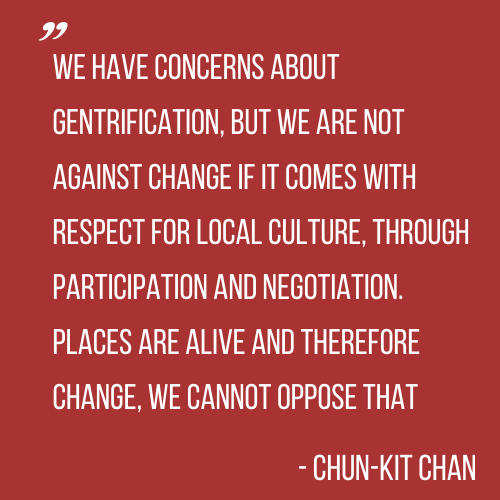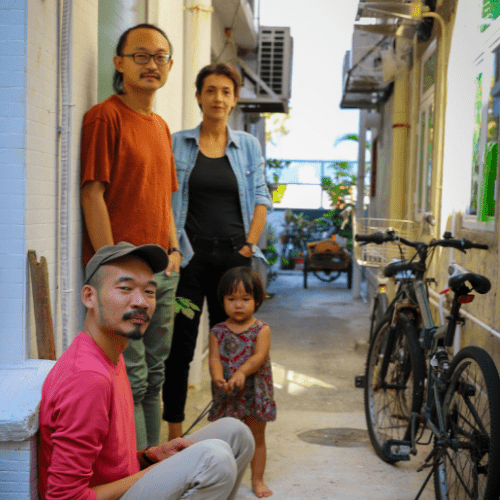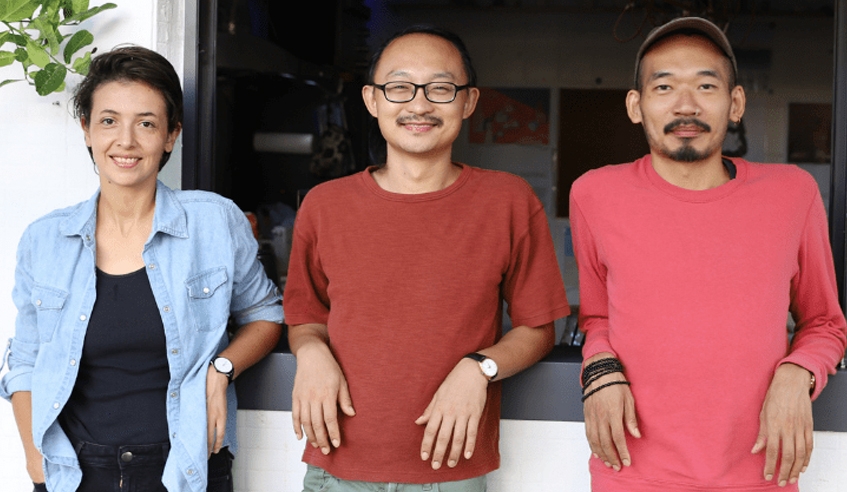Meet Myriem Alnet, Chun-Kit Chan and Kai-Chun Yip, the Peng Chau trio dedicated to celebrating and preserving island life
Reporting By Rachel Sadler Photos By Tal Shahar – www.magnificent-hkg.com
Tucked down an alleyway on Peng Chau, Islanders Space is an office-come-shop-come-café, and it’s where you’ll find Myriem Alnet, Chun-Kit Chan (Kit) and Kai-Chun Yip (Chun), the founders of the Inter-Island Festival, pretty much 24/7.
Kit and Myriem live above Islanders Space with their two-year-old daughter. It has morphed out of Sun Sat Store, which Kit opened in 2014 on moving to Peng Chau. Back then it was a place to pick up local handicrafts and vintage collectibles, now it’s also somewhere for locals to enjoy talks, music performances and some good old island gossip.
It was here that store owner Kit, Myriem, a French-born urbanist, and Chun, an artist, curator and producer, dreamt up the Inter-Island Festival. The idea was to celebrate and help preserve the unique character of the outlying islands, specifically Lantau, Cheung Chau and Peng Chau, by introducing festivalgoers to their vibrant art forms and traditions.
The first three-day Inter-Island Festival took place in March this year having been postponed from December 2020 due to COVID-19 restrictions. Whether or not the trio decide to put on a follow-up festival in 2022 (and we sincerely hope they do), what they achieved in March is worth revisiting. Something to celebrate at the end of a tough year. A definite highlight!
THE INTER-ISLAND FESTIVAL
Q: Where did the idea for the Inter-Island Festival come from?
A: “When I took the Inter-Island Ferry for the first time, when I moved to Peng Chau in 2017, I got to see a very different side to Hong Kong, different from Victoria Harbour’s high-rises. I really enjoyed the journey. It got me thinking, since this ferry connects all these fascinating islands, it would be very interesting to base a festival around it,” says Chun.
A: “We wanted islanders (and visitors) to experience and appreciate island life from a different perspective. People jumped on the Inter-Island Ferry and made their way between Cheung Chau, Mui Wo, Chi Ma Wan and Peng Chau to take part in the festival. We brought together local performers, experts and artists, with activities going on at the four locations concurrently, and scheduled to match ferry times,” adds Myriem.”
Q: How was the response from the general public and people looking to perform and provide workshops?
A: “Around 10,000 people attended the festival over three days, and we worked with more than 50 collaborators, all islanders,” says Kit.
A: “We told people to expect activities ranging from workshops and performances to tours but not to expect them to be big and loud. We planned activities that would blend with the insular island life and hoped festival goers would embrace their subtlety with us,” Myriem says.

ISLAND CULTURE
Q: Can you tell us about some of the Lantau workshops and volunteers?
A: “The Lantau Society held a workshop, ‘The Story of Mui Wo Tofu Skins.’ In the 60s and 70s, Mui Wo was very
A: “Dried-leaf ink making is another Mui Wo tradition. Sap Fong, Jess Kong’s workshop introduced participants to picking up dried leaves and turning them into ink,” adds Chun.
Q: Living on Lantau, we’re strongly connected to nature. Did many of the workshops highlight this?
A: “Liane Yiu Yiu, a Mui Wo resident, is a visual artist who works with materials she takes from nature. Her workshop ‘The Art of Foraging’ had participants foraging, and then cooking a dinner using what they’d found,” says Kit.
A: “There was also a workshop tour in Chi Ma Wan led by Miko Yeung, who lives in Pui O. Miko took us on a walk-through Chi Ma Wan; she showed us the buffalo, and we found out about a ‘jail’ there that used to house Vietnamese refugees. There were many prison-like detention centres like this in Hong Kong in the early ‘80s,” says Chun.
Q: And Chun, did you showcase any of your own artwork?
A: “I had an open house; it was called Flat Gallery. My house was open on the Saturday and Sunday for people to view my visual arts installations. Around 100 people visited, limited to groups of four following COVID-19 guidelines. I wanted to give a point of view, so I recorded a guide for people to listen to as they walked around my house.”

ISLAND CONSERVATION
Q: Concerns about development of the islands was another reason you held the festival?
A: “We discussed the idea a while back, and acted on it in June 2019. People were concerned about the government’s plans, principally about the Lantau Tomorrow Vision development project. Islanders felt worried and we felt like we needed to do something. We submitted the proposal to the Hong Kong Arts Development Council and were accepted,” says Chun.
A: “Some residents are against Lantau Tomorrow, they believe it is damaging for the islands’ environment – pollution will go up and culture will also be lost,” says Kit.
A:“Island life is unique and made by a diversity of people, and we wanted to bring everyone, islanders or not, together to appreciate this character. If they are deemed necessary, we hope plans to develop the islands will at least take the local specificities into account,” says Myriem.
Q: So, it all points to the Lantau Tomorrow development project?
A: “It’s still so far away, but at the same time it haunts the islands, and some residents may leave. It looks very arbitrary, and it’s government-funded so people feel hopeless. These plans for development have been threatening islanders’ way of life, since they were first proposed in 2014,” says Chun.
A: “The government only discusses the damage it may cause to marine life, but we are also a special species living here, it is very important that we too don’t disappear,” Chun adds.
Q: Were you aiming to encourage more Hong Kongers to move to the islands?
A: “The festival should not create gentrification in a bad way; it was about showing the islands’ culture. It was a way to help people, who are moving to the islands, to choose to protect the environment and connect with the culture. We have concerns about gentrification, but we are not against change if it comes with respect for local culture, through participation and negotiation. Places are alive and therefore change, we cannot oppose that,” says Kit.
Q: How has gentrification affected life on Peng Chau?
A: “Some people think how can we give Peng Chau a new lease of life. For the new to grow and blend with the local culture is very important. If you can do this then actually, it is just a natural development. Most of the shops here, including Islanders Space, are still small shops; the Peng Chau way is quite slow. The island is small, and you know your neighbours. So far, the changes seem natural,” concludes Kit.
